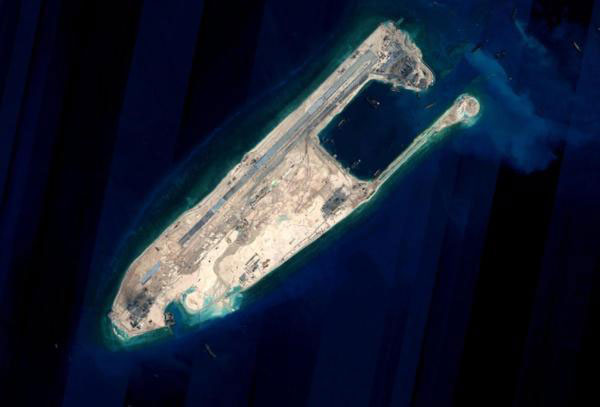 |
|
This satellite image shows the Yongshu Jiao of China's Nansha Islands. [Photo/Xinhua] |
In the South China Sea arbitration case that the Philippines initiated, the legal status of the islands is a focus. But the Philippines' description of the islands is to serve its litigation strategy in the arbitration.
Manila's case not only distorts the facts but also misinterprets the United Nations Convention on the Law of the Sea on purpose.
The dispute between China and the Philippines originates from the latter's infringement upon China's territorial sovereignty and marine interests.
The dispute on sovereignty and maritime boundary delimitation are not subject to the jurisdiction of the Convention.
Manila pushed forward the arbitration proceedings to avoid the core of the dispute-sovereignty-and so sidestep the Convention's regulations.
To do this, Manila has created the illusion that the dispute is about the different interpretations of the Convention by China and the Philippines. It has sought to cover up its true intention and core proposition, and so hide the fact that it has no right to resort to arbitration.
To make its arbitration request seem more "self-evident", Manila has presented a series of specious arguments to cover up the facts as follows.
First, Manila's points of view on the South China Sea islands are seriously against historical facts and the truth. It cannot provide any effective historical evidence, and instead just makes irresponsible remarks. This is a characteristic of Manila's discourse. It deliberately whitewashes its stealing and illegal occupation of China's islands.
Second, Manila's description of the islands' legal status conflicts with the rules of the Convention and customary international laws.
The Philippines claims that China cannot claim the exclusive economic zone and the continental shelf because some of the Nansha Islands are not islands. Manila has deliberately lied about the geographic property of these islands. It denies the Nansha Islands as an entirety and omits information about Taiping Island, which is a large island in the South China Sea. The Philippines' argument about the islands thus lacks any credibility.
Third, the Philippines' perception of the islands' status is contradictory to its previous stance. It recognized these islands in the South China Sea as islands that can claim exclusive economic zone and continental shelf in its bills, domestic court judgments and diplomatic notes, but denies their legal status as islands in its arbitration case.
Last but not least, its arbitration request contains some ill intentions. The South China Sea is a territorial dispute that does not fall under the jurisdiction of the Permanent Court of Arbitration. But the Philippines intentionally describes it as a case about the legal status of the islands and reefs as the status of them could be subjected to the arbitration court.
The Philippines specifically targets islands that China controls, and does not include the Chinese islands it occupies in its arbitration request. Manila also intentionally avoids mentioning the Chinese islands that are occupied by some other countries in the South China Sea. It is obvious that Manila is trying to gain support from other countries that have disputes with China. It is a well-known fact that China has always had sovereignty over the Nansha Islands. According to the Convention, the Nansha Islands cannot be split into individual islands when it comes to their sovereignty. Manila has "divided" the Nansha Islands on purpose in its arbitration request, in order to portray China as a "late comer" in the dispute. Manila is also making efforts to disguise the fact that it illegally occupied some of China's islands in the South China Sea.
The author is a Beijing-based observer of international issues.

I’ve lived in China for quite a considerable time including my graduate school years, travelled and worked in a few cities and still choose my destination taking into consideration the density of smog or PM2.5 particulate matter in the region.